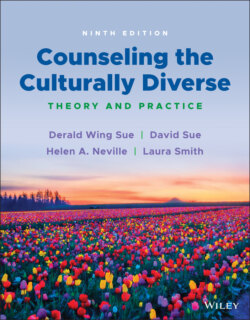Читать книгу Counseling the Culturally Diverse - Laura Smith L. - Страница 59
WHAT IS CULTURAL COMPETENCE?
ОглавлениеConsistent with the definition of MCT, it becomes clear that culturally responsive healers are working toward several primary goals (American Psychological Association, 2017; Ratts et al., 2015; Sue et al., 1998). First, culturally competent helping professionals are ones who are actively in the process of becoming aware of their own values, biases, assumptions about human behavior, preconceived notions, personal limitations, and so forth. Second, culturally competent helping professionals are ones who actively attempt to understand the worldview of their culturally diverse clients and the sociohistorical context in which that worldview develops. In other words, what are the client's values and assumptions about human behavior, biases, and so on? Third, culturally competent helping professionals are ones who are in the process of actively developing and practicing appropriate, relevant, and sensitive intervention strategies and skills in working with their culturally diverse clients. These three attributes make it clear that cultural competence is an active, developmental, and ongoing process and that it is aspirational rather than achieved. Specifically, we define cultural competence in the following manner.
Cultural competence is a lifelong process in which one works to develop the ability to engage in actions or create conditions that maximize the optimal development of client and client systems. Multicultural counseling competence is aspirational and consists of counselors acquiring awareness, knowledge, and skills needed to function effectively in a pluralistic democratic society (ability to communicate, interact, negotiate, and intervene on behalf of clients from diverse backgrounds), and on an organizational/societal level, advocating effectively to develop new theories, practices, policies, and organizational structures that are more responsive to all groups. (Sue & Torino, 2005)
This definition of cultural competence in the helping professions makes it clear that the conventional one‐to‐one, in‐the‐office, objective form of treatment aimed at remediation of existing problems may be at odds with the sociopolitical and cultural experiences of clients. Like the complementary definition of MCT, it addresses not only clients (individuals, families, and groups) but also client systems (institutions, policies, and practices that may be unhealthy or problematic for healthy development). Addressing client systems is especially important if problems reside outside rather than inside the client. For example, prejudice and discrimination such as racism, sexism, and homophobia may impede the healthy functioning of individuals and groups in our society.
